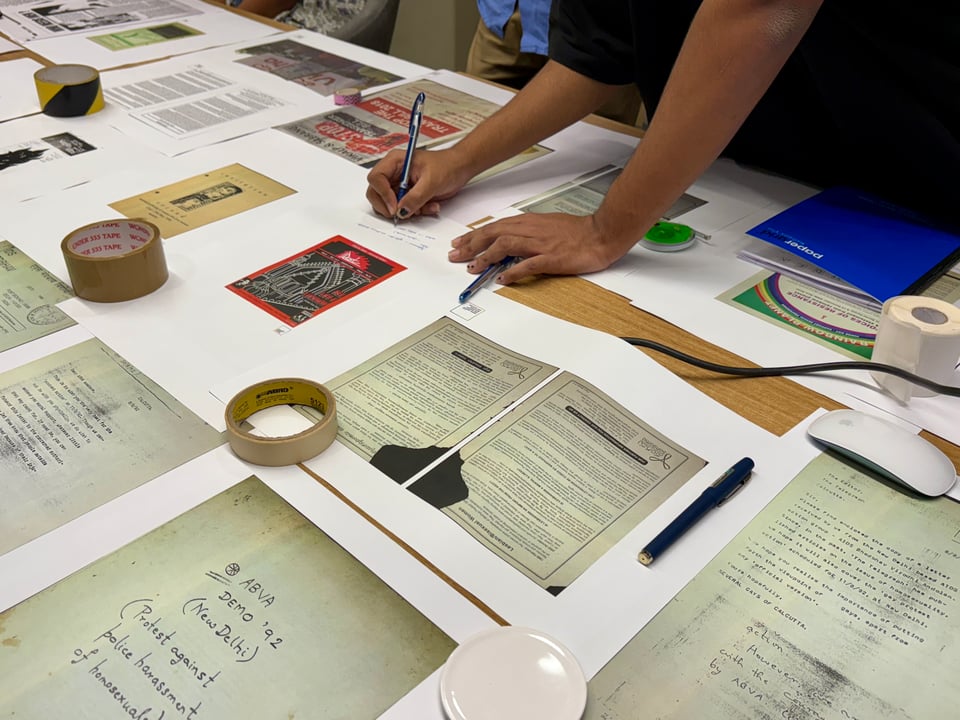Labour
Felt Notes

ID: Annotating copies of materials from QAMRA at the “Reading (in) the Queer Archive” workshop I co-facilitated with Susan Potter at the National Law School of India University. Image courtesy of Kush Patel (July 2025).
I wrote the following postscript in my Winter 2023 lab report to mark a particular moment in the lab's history and one that I return to as a text to read and re-read against academic patriarchy.
“The work of shaping and running The Just Futures Co-lab is labour-intensive, joyful, deeply embodied, and demanding not in response to any external pressures, but rather from within itself, especially given: a) its commitments to enriching the academic and professional development of participating members; b) its refusal to normative and exploitative lab or research practices in academia; and c) its accountabilities and responsibilities to the collaborating communities and publics. The work of sustaining this Co-lab is also extremely challenging, considering the long history of gendered workload inequities in institutional spaces, involving those of us who are untenured, always made precarious, and living outside the system’s cis-heteronormative defaults. This report writing and editing for me is intellectual work and something that is neither an institutional norm nor an expected academic form, and yet it is these details that uphold honesty and transparency in academic practice and enable me to advocate for rigor and depth of research and community building with students and each other at the postgraduate level.”
As the lab enters its fourth year this semester, I am beginning to feel the compounded strength and weight of care work underpinning this space. “Care work,” as I said whilst quoting and building upon the writings of Leah Lakshmi Piepzna-Samarasinha, “is what you do to survive on a day-to-day basis; to survive with each other.” [1] That this call to survive—and to flourish—is in equal parts everyday and structural, working with and working on the realities of connection, joy, inspiration, exhaustion, and rage is significant here. That these themes are recurring in my scholarship, including scholarly care connected to teaching, mentoring, program-building, and worldmaking also explains how and why I experience their strength and weight jointly. What then does it mean to have conversations about a digital humanities lab that may be in an institution but not of that institution? How might I continue to annotate this labour-intensive, joyful, and deeply material care work, which inhabits a set of knowledge locations that feel less hostile to the reality and experience of queer-trans being—and to queer- and trans-feminist scholarly production itself? [2] Such are the recurring mappings of a lab whose readership widened this month in directions both serendipitous and intentional and with questions both persistent and new.
Notes
[1] Chris Friend, interview with Ashley Caranto Morford, Arun Jacob, and Kush Patel (Pedagogy of the Digitally Oppressed Collective), Teacher of the Ear: The Podcast from Hybrid Pedagogy, November 10, 2021, https://hybridpedagogy.org/care/
[2] I have traveled with these questions and their different versions to a range of sites, conferences, and publics to keep alive the discourse on DH lab work in all of its situated, material, and embodied politics.
About
Felt Notes are monthly dispatches about the work of the Just Futures Co-lab, and the co-labouring worlds of research and teaching in art, design, and the digital humanities that it scaffolds, furthers, and amplifies. The letter writing translates the ever so negotiated nature of this space at Srishti Manipal Institute and the discourse and scholarship on equity and justice I produce with students and wider academic and non-academic community members through critical pedagogy; archival and database constructions; interactive digital storytelling; and inquiries into queer- and trans-feminist digital technologies and knowledge infrastructures.
I hope reading this letter and its upcoming segments are a meaningful experience for you. If you aren’t subscribed yet, you may do so here. If you are already subscribed, I would love for you to share the link with friends and trusted networks as we make sense of our relationships to technology as well as our relationships to each other via technology. If you would like to write or co-write a letter in the future or share any announcements, please feel free to get in touch with me, and whilst you’re here, please also check out the Felt Notes Archive.
Kush Patel